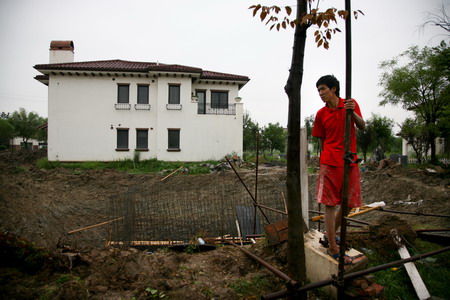Economy
Villas still give investors home comforts
By Yu Ran (China Daily)
Updated: 2011-02-21 09:49
 |
Large Medium Small |
|
 |
|
This unoccupied house is in the Jingjin New District in Tianjin, which is said by its developers to be Asia's largest luxury villa compound. It has a vacancy rate of 90 percent seven years after it was built. [Photo / China Daily] |
Dong Zhenxing was pondering what to do with the villa he has owned for more than two years but has never lived in.
The two-story property in Anting New Town in Shanghai's Jiading district sits next to the Shanghai International Circuit, home to the Formula One Chinese Grand Prix, and has been empty since he bought it in 2008.
"I'm not like those housing speculators," said Dong, a trading company owner who exports electronic appliances manufactured in Kunshan, Jiangsu province, and whose annual income is about 10 million yuan ($1.52 million).
"I don't think I will buy another villa for the moment because a trial property tax is being brought in and you have to spend too long waiting for a good return on the investment."
Finally, the 55-year-old shrugged and announced he would decorate the two-story villa and move his family in next year if prices don't rise enough to yield what he regards as a healthy profit.
Dong is not alone in sitting on an empty property and wondering what government policies might do to its value.
Villas have become especially attractive to speculators who have become used to making a quick buck from a market that seemed to be forever on an upward trajectory.
The authorities see things differently. They are more keen on ensuring the stability and affordability of house prices.
|
||||
China's real estate market remains overheated, even after a slew of tightening measures last year, including higher down payments, higher lending rates for second-home buyers and two increases in the benchmark lending rate.
Chongqing will tax all villas as well as new apartments that cost at least twice the average price of all newly built homes in the southwestern city.
All newly bought additional homes of permanent residents in Shanghai will be taxed if the average floor space for each family member in all the properties added together is more than 60 square meters, the Shanghai municipal government said.
All new homes bought by non-permanent residents will also be taxed, but the buyers can get the money back for their first new homes after they have lived and worked in Shanghai for three years.
"The levy is designed to help regulate the property market and to keep house purchases at a reasonable level," said Shao Minghao, head of research at Shanghai Hanyu Property Consulting Co Ltd. "It will definitely affect the villa market eventually."
Shao said fewer villas will be sold because they tend to be more expensive than apartments and therefore will attract more tax. As a result, a real estate bubble might be averted.
The authorities determine whether a home is vacant by measuring how much electricity and water are used. It is very difficult to define and calculate vacancy rates because many are inhabited only on weekends or during holidays, said Yang Hongxu, a senior researcher at E-House China Research and Development Institute in Shanghai.
| 分享按钮 |



